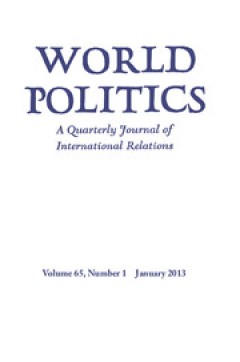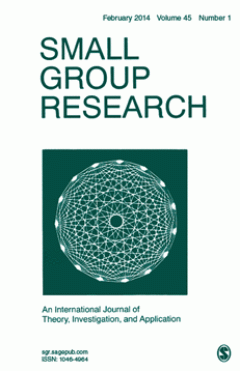Filter by

Evaluation, Volume 23, Number 1, January 2017
- Edition
- -
- ISBN/ISSN
- 13563890
- Collation
- -
- Series Title
- -
- Call Number
- -
- Edition
- -
- ISBN/ISSN
- 13563890
- Collation
- -
- Series Title
- -
- Call Number
- -

Critical Social Policy, Volume 37, Number 1, February 2017
- Edition
- -
- ISBN/ISSN
- 02610183
- Collation
- -
- Series Title
- -
- Call Number
- -
- Edition
- -
- ISBN/ISSN
- 02610183
- Collation
- -
- Series Title
- -
- Call Number
- -

World Politics, Volume 69, Number 2, April 2017
- Edition
- -
- ISBN/ISSN
- 00438871
- Collation
- -
- Series Title
- -
- Call Number
- -
- Edition
- -
- ISBN/ISSN
- 00438871
- Collation
- -
- Series Title
- -
- Call Number
- -

World Politics, Volume 69, Number 1, January 2017
- Edition
- -
- ISBN/ISSN
- 00438871
- Collation
- -
- Series Title
- -
- Call Number
- -
- Edition
- -
- ISBN/ISSN
- 00438871
- Collation
- -
- Series Title
- -
- Call Number
- -

Small Group Research, Volume 48, Number 2, April 2017
- Edition
- -
- ISBN/ISSN
- 10464964
- Collation
- -
- Series Title
- -
- Call Number
- -
- Edition
- -
- ISBN/ISSN
- 10464964
- Collation
- -
- Series Title
- -
- Call Number
- -

Small Group Research, Volume 48, Number 1, February 2017
- Edition
- -
- ISBN/ISSN
- 10464964
- Collation
- -
- Series Title
- -
- Call Number
- -
- Edition
- -
- ISBN/ISSN
- 10464964
- Collation
- -
- Series Title
- -
- Call Number
- -

Journal of Theoretical Politics, Volume 29, Number 2, April 2017
- Edition
- -
- ISBN/ISSN
- 0951-6298
- Collation
- -
- Series Title
- -
- Call Number
- -
- Edition
- -
- ISBN/ISSN
- 0951-6298
- Collation
- -
- Series Title
- -
- Call Number
- -

Journal of Theoretical Politics, Volume 29, Issue 1, January 2017
- Edition
- -
- ISBN/ISSN
- 0951-6298
- Collation
- -
- Series Title
- -
- Call Number
- -
- Edition
- -
- ISBN/ISSN
- 0951-6298
- Collation
- -
- Series Title
- -
- Call Number
- -

Gender & Society, Volume 31, Issue 2, April 2017
- Edition
- -
- ISBN/ISSN
- 08912432
- Collation
- -
- Series Title
- -
- Call Number
- -
- Edition
- -
- ISBN/ISSN
- 08912432
- Collation
- -
- Series Title
- -
- Call Number
- -

Gender & Society, Volume 31, Issue 1, February 2017
- Edition
- -
- ISBN/ISSN
- 08912432
- Collation
- -
- Series Title
- -
- Call Number
- -
- Edition
- -
- ISBN/ISSN
- 08912432
- Collation
- -
- Series Title
- -
- Call Number
- -

Journal of Democracy, Volume 28, Number 2, April 2017
- Edition
- -
- ISBN/ISSN
- 10455736
- Collation
- -
- Series Title
- -
- Call Number
- -
- Edition
- -
- ISBN/ISSN
- 10455736
- Collation
- -
- Series Title
- -
- Call Number
- -

The Rise of Localism in Hong Kong
The 2016 Legislative Council (LegCo) election marked a watershed in the political development of Hong Kong. The vote reflected the emergence of increasing divisions within the democratic and pro-Beijing (or pro-establishment) camps, the institutionalization of post-Umbrella Movement activism, and especially the rise of localism. At its heart, Localism signifies a commitment to protecting the in…
- Edition
- Volume 28, Number 1, January 2017, pp. 157-171
- ISBN/ISSN
- 10455736
- Collation
- -
- Series Title
- Journal of Democracy
- Call Number
- -

The Fading of the Anti-Coup Norm
In the years since the early 1990s, tolerance within the international community for coups d’état has waned, and a new “anti-coup norm” has become institutionalized in international rulebooks and laws. New standards have emerged that require international actors to help ensure that ousted leaders are returned to power and that coup leaders are excluded from future politics. Despite significant …
- Edition
- Volume 28, Number 1, January 2017, pp. 144-156
- ISBN/ISSN
- 10455736
- Collation
- -
- Series Title
- Journal of Democracy
- Call Number
- -

The Secret Supports of Mongolian Democracy
In postcommunist Eurasia, a region littered with failed democratic experiments and frozen autocracies, Mongolia is an outlier. Mongolian democracy is robust in spite of the country’s high poverty levels and its proximity to nondemocratic regimes. The key to the success of Mongolia’s democracy lies in its powerful civil society. From the first sign of the country’s political opening in 1989 to t…
- Edition
- Volume 28, Number 1, January 2017, pp. 129-143
- ISBN/ISSN
- 10455736
- Collation
- -
- Series Title
- Journal of Democracy
- Call Number
- -

The Never-Boring Balkans: The Elections of 2016
A quarter-century since the troubled democratic transitions of the former Yugoslav republics, elections in the region are competitive and few would expect that losers would dare to reject voters’ verdict. Europe’s proximity and the institutions of Euro-Atlantic integration have greatly aided the region’s transformation. Yet this tale of a region eager to integrate with the West is not the whole…
- Edition
- Volume 28, Number 1, January 2017, pp. 116-128
- ISBN/ISSN
- 10455736
- Collation
- -
- Series Title
- Journal of Democracy
- Call Number
- -

Tunisia’s Islamists and the Turkish Model
Authoritarian regimes in the Middle East and North Africa (MENA) region have historically excluded Islamist parties from the political process, making it difficult to assess assumptions about how they would behave in power, let alone about their potential to stimulate and steward a democratic transition. Until Tunisia’s Ennahda party won elections in 2011, no Islamist party in (or beyond) the M…
- Edition
- Volume 28, Number 1, January 2017, pp. 102-115
- ISBN/ISSN
- 10455736
- Collation
- -
- Series Title
- Journal of Democracy
- Call Number
- -

The Three Regions of the Old Soviet Bloc
The 21 former Soviet-bloc countries fall into three classes of political systems representing a good equilibrium, a bad equilibrium, and a final group that teeters between the two. The nine Central and East European countries that have become EU members represent a good equilibrium: they retain democratic political systems and have corruption under reasonable control. Seven post-Soviet countrie…
- Edition
- -
- ISBN/ISSN
- 10455736
- Collation
- -
- Series Title
- Journal of Democracy
- Call Number
- -

Violence Against Women in Politics
Reports of physical attacks, intimidation, and harassment aimed at female politicians, activists, and voters have grown as women have become more politically engaged around the world. Often dismissed as the “cost of doing politics,” such acts pose a serious threat to democracy and raise questions about the progress that has been made globally toward incorporating women as full political actors.…
- Edition
- Volume 28, Number 1, January 2017, pp. 74-88
- ISBN/ISSN
- 10455736
- Collation
- -
- Series Title
- Journal of Democracy
- Call Number
- -

Turkey: How the Coup Failed
On 15 July 2016, Turkey was shaken by an attempted coup. For the first time in modern Turkish history—a history littered with attempted coups—the elected government thwarted the putsch. We suggest that the success of the ruling Justice and Development Party (AKP) in defeating the coup attempt is part and parcel of its competitive authoritarian regime. On the one hand, AKP’s extensive access to …
- Edition
- Volume 28, Number 1, January 2017, pp. 59-73
- ISBN/ISSN
- 10455736
- Collation
- -
- Series Title
- Journal of Democracy
- Call Number
- -

A Transformed Political Landscape
The 23 June 2016 referendum on Britain’s EU membership exposed deep fractures within the British party system. Products of global political, cultural, and financial trends, these fractures have diminished the power of the U.K. government and of other Western democracies alike. Though the EU’s role in these changes was ambiguous, it became a scapegoat for them, and on the initiative of Conservat…
- Edition
- Volume 28, Number 1, January 2017, pp. 53-58
- ISBN/ISSN
- 10455736
- Collation
- -
- Series Title
- Journal of Democracy
- Call Number
- -
 Computer Science, Information & General Works
Computer Science, Information & General Works  Philosophy & Psychology
Philosophy & Psychology  Religion
Religion  Social Sciences
Social Sciences  Language
Language  Pure Science
Pure Science  Applied Sciences
Applied Sciences  Art & Recreation
Art & Recreation  Literature
Literature  History & Geography
History & Geography